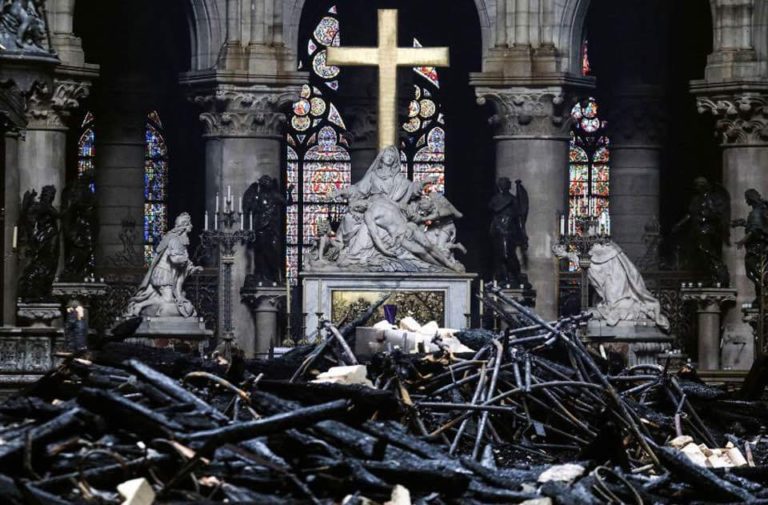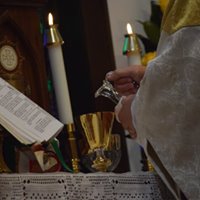Doctrine of Salvation (Soteriology)
Soteriology – (doctrine of Salvation)
Here are some thoughts to muse on regarding the relationship between grace and freedom. The Lord in His love and power enables and ennobles us to worship and serve Him by and with the theological virtues of faith, hope and love infused into our souls in Baptism and Confirmation: the Lord Jesus calls us to a docility, an openness to His working of grace in our souls. As we seek to love God and to eschew evil, from our hearts, to keep the Commandments and to avoid temptations to sin, we are drawn by the power of God’s love and grace ever more deeply into communion with Him. We should wait upon the Lord in prayer and allow Him to work invisibly in us by His presence and gifts. In the Christian pilgrimage, sojourning with Jesus in this world, nourished by Word and Sacrament, healed and transformed by his gifts given to us freely, we are conformed to His likeness and are given the facility, the ability, truly to grow in holiness and love. We really can become Saints ontologically, in our being, the image and likeness of Christ, ‘little Christs’ as Saint Cyril of Jerusalem describes this mystery, as we correspond freely with grace and learn from the school of Christ, the school of sanctity, to become more and more like Him. Men can become intrinsically holy and good by resting on the promises of Christ and cooperating with the grace God gives. Justification and sanctification are not legal fictions, but imparted righteousness: God does in us what He declares He will do. Simply trust in the Lord and allow Him to move in you – and you will grow ever deeper into the Love of God, the fellowship of the Holy Trinity.
One of the essential dogmas of Catholic soteriology is synergy, the free co-operation of the human will with the divine grace in the process of justification and sanctification (which are distinct but inseparable). Our Lord assumes human nature in the Incarnation in order to heal, restore, transform, sanctify and divinise our human nature, including our human will. If man does not cooperate with divine grace in the process of divinisation or theosis, he fails to be truly human and loses the essential characteristic that makes him the Imago Dei and the Imago Christi: freedom. There can be no love, faith or hope, no cardinal or theological virtue of any kind without the free exercise of the human will, human freedom, in correspondence to the divine initiative and the divine grace which heals and perfects all things in Christ. The original nature of man was sinlessness and innocence; the redeemed nature of man is God-likeness. In Christ man is raised again not only to the full restoration of the divine image, but is given by grace the divine likeness in which man, by virtue, attains to holiness and divinisation, sanctity. The Incarnate Lord, precisely because He has two wills which harmoniously cooperate in the One Person of Christ in communion with the Father, enables our human will to cooperate with the divine will. Our human will, united to Christ’s human will, harmoniously unites in communion with the divine will. Monothelitism, ‘one-will-ism’ in Christ, prevents this divine-human synergy from taking place and is thus heretical. We become by grace what God is by nature. Grace is the uncreated life of the Holy Trinity given to man that man may participate in the energy, the dynamic life of God Himself. Such a exchange is only possible through the Incarnation as a real assumption and transformation of human nature.
The Sacraments mediately communicate the divine life in such a way that man’s nature is divinised. But man must freely receive and apply what is given him. For this cause, with its denial of objective sacramental grace, extreme protestantism rejects any concept of sainthood. Calvinism, properly speaking, is certainly an error of gnostic or Manichean dimensions precisely because by its heresy of total depravity of man it refuses to allow Jesus Christ His work of redemption in the objective and complete restoration of the human person, body, mind, soul and will to total communion with the Tri-Hypostatic Godhead. Calvinistic soteriology, to my mind, leads to a Nestorian Christology and a denial of the Incarnation. Whereas Lutheranism teaches of form of monophysiticism by affirming a ubiquity of the human nature of the Risen Christ in which the natures of Christ are fused and blurred and man is redeemed by a God who is no longer truly human (hence an exclusive belief in only a forensic exterior imputed righteousness in which man cannot be ontically united to the divine life but is merely declared to be accepted by God), Calvinism so radically detaches Our Lord from human nature (because of its view of the evil of human nature and of creation) and from human redemption through the Incarnation that it winds up separating the divine and human natures in Christ. A solitary imputed righteousness, to the absolute exclusion of a real imparting or infusion of divine grace, is either Monophysite or Arian, depending on which view one takes. Arius of Alexandria taught that Christ was adopted as a divine being although created, exactly through an exclusive imputed righteousness which did not consider His created status but simply declared Him to be God by grace. The Arian Christ is in fact what the Church would describe as the Orthodox saint. We become God by grace (II Peter 1.4). We are adopted as God’s children by grace (Romans 8, Galatians 4). The Catholic Mary, like all divinised created human persons, holds the position in orthodox Catholicism which Christ holds in Arianism. In this respect classic protestant soteriology, if it is understood to deny the necessity of the incarnational-sacramental order, is eerily Arian.




![How did the early Christians worship? Let’s us read of early church worship. The First Apology (St. Justin Martyr) [a.d. 110-165.]](https://www.stmichaelsanglican.org/wp-content/uploads/2018/04/church-history1-e1562081769989.jpg)
